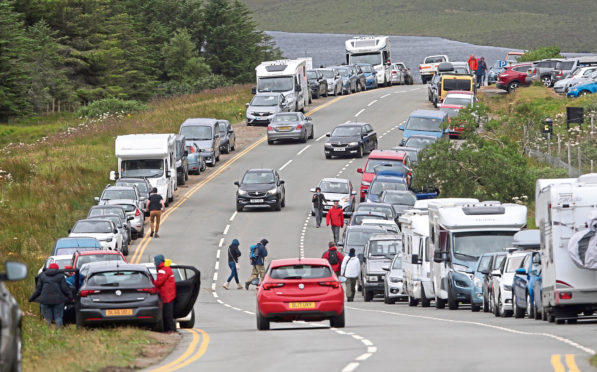The reopened Cluanie Inn has a Bombay cheese toastie on the menu. The chef is from India, as is the owner. The famous tourist stopover and mountaineers’ inn is in new hands, part of the boom in the hotel business across Scotland.
From the Waterfront of Dundee, to the Fife Arms in Braemar, to the rebuilt Kingshouse on the moors above Glencoe, the nation’s hospitality industry is flush with investment cash. Donald Trump has permission for a Brigadoon on the beach, while Skye spent another year rammed with selfie seekers.
What we offer tourists has dramatically changed. No longer the nylon sheets and macaroni with flaccid chips. It’s all gone local, upmarket, better. A B&B in Armadale on Skye wins architecture prizes and is booked out months in advance. The bar at the Clachaig Inn is sentried with local beers. The food at Mhor 84 or the Kylesku Hotel is worth the trip alone.
Once people made a trip to The Altnaharrie near Ullapool, then to the Three Chimneys in Skye. Now, there are many food destinations, from Applecross to Inver on Loch Fyne. You can still get limp chips if you want, but you’ll also get the triple cooked variety nearby.
The damp carpets have been rolled away and the unsmiling staff replaced with pleasant folk from the continent.
If only this private investment had been matched with proper infrastructure. The ring road around Aberdeen and the dualling of the A9 are good, but there is still no proper east/west connection, and the A889 out of Dalwhinnie is a national embarrassment. Sixteen-wheelers edge down a single track, scaring the wits out of German camper van drivers coming the other way.
The ferries do more to choke business growth on the islands than any other factor. The service unreliable, the boats knackered.
Most importantly, there are simply not enough sailings – bemused Belgians stand at the dock, wondering why a country would make it so hard to visit such stunning beauty.
The North Coast 500 has become a race track for sports cars, the drivers shocked when two lanes become a single strip of tarmac and the traffic backs up. You’d think the success of this marketing ruse would prompt investment, but there is none.
Make the mistake of visiting Skye’s natural beauty and you’ll find an impromptu car park of 50 vehicles trying to negotiate a stone dyke, a ditch and a Danish motorcyclist insistent on stopping for no one.
The argument for not returning the Parthenon marbles is that the Greeks cannot be trusted with their treasures. Should you go to Greece, you’ll find the opposite. They are very aware of their tourist attractions and provide car parks, guides and services that you expect.
What’s more, the Greeks also run lots of ferries with lots of room for the many islands they have. And they have built lots of roads to allow big coaches and camper vans to go to the beauty spots. The irony is Lord Elgin, pincher of the marbles, would find his homeland much less tourism savvy than Greece today.
Victorian railway viaducts echo the grand structures of the classical world, a good example being the Glenfinnan viaduct. Here there is some car parking, but that was intended for the monument to Prince Charlie across the road. Modern tourists don’t care much for real history, preferring cinema fantasy.
Nowadays the car park is packed, cars are parked on every verge and siding, and smitten Harry Potter fans mill on the road, all hoping to see the viaduct, which featured in a couple of the boy wizard films. Not a penny of public investment has gone into improving the facilities and locals must endure the daily chaos.
It begins to make you wonder if outsiders don’t have a better grip on Scotland’s worth than Scots. The obvious opportunity in Scotland’s beauty and booming global tourism seems to have been seized by investors from India, Ireland and Germany. The money for the new hotels comes in, but from abroad.
Is it that Scottish businesspeople and investors are simply too wed to the idea of the empty Highlands, of Scotland as a place for private ownership, not public pleasure.
This explains why the country north of the central belt has so often seen waves of outside investment. If it’s not the English Home Counties looking to play at dishevelled nobility, then its folk from the continent or America who see the money in the hills.
Meanwhile, Scottish business is too busy whining about a lack of government support, and the government too dismissive of the opportunity it has in its own backyard. That Scotland’s elite, whether it’s the moneyed or its political class, have managed Scotland north of the forth badly is an historical given.
The shame is even after devolution and all the talk of difference, as a nation we still neglect the infrastructure and opportunity of our land, water and sky. We are still blind to our own worth.



